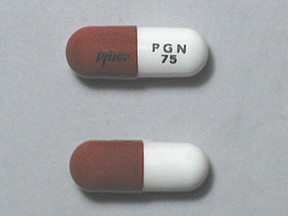PREGABALIN - ORAL
PHONETIC PRONUNCIATION: (pree-GAH-ba-lin)
COMMON BRAND NAME(S): Lyrica
GENERIC NAME(S): pregabalin
Uses
USES: This medication is used to treat pain caused by nerve damage due to diabetes, shingles (herpes zoster) infection, or spinal cord injury. This medication is also used to treat pain in people with fibromyalgia. It is also used with other medications to treat certain types of seizures (focal seizures).
How to use PREGABALIN - ORAL
HOW TO USE: Read the Medication Guide and, if available, the Patient Information Leaflet provided by your pharmacist before you start using pregabalin and each time you get a refill. If you have any questions regarding the information, consult your doctor or pharmacist. Take this medication by mouth as directed by your doctor, usually 2 to 3 times a day with or without food. The dosage is based on your medical condition, kidney function, and response to treatment. Children's dosage is also based on weight. If you are using the liquid form of this medication, carefully measure the dose using a special measuring device/spoon. Do not use a household spoon because you may not get the correct dose. To reduce your risk of side effects (such as dizziness and drowsiness), your doctor may direct you to start this medication at a low dose and gradually increase your dose. Follow your doctor's instructions carefully. Use this medication regularly to get the most benefit from it. To help you remember, take it at the same times each day. This drug works best when the amount of medicine in your body is kept at a constant level. Therefore it is best to take pregabalin at evenly spaced intervals throughout the day and night. Do not stop taking this medication without consulting your doctor. Some conditions (such as seizures) may become worse when this drug is suddenly stopped. Also, you may experience symptoms such as difficulty sleeping, nausea, headache and diarrhea. To prevent these symptoms while you are stopping treatment with this drug, your doctor may reduce your dose gradually. Report any new or worsening symptoms right away. Though it helps many people, this medication may sometimes cause addiction. This risk may be higher if you have a substance use disorder (such as overuse of or addiction to drugs/alcohol). Take this medication exactly as prescribed to lower the risk of addiction. Ask your doctor or pharmacist for more details. Tell your doctor if your condition persists or worsens.
Side Effects
Precautions
Interactions
Overdose
Images
Reviews
Faq for PREGABALIN - ORAL
Pregabalin is an oral medication that belongs to the class of drugs known as anticonvulsants. It works by reducing the abnormal electrical activity in the brain, thus effectively treating seizures, nerve pain, and certain psychiatric disorders.
Pregabalin is frequently prescribed for the treatment of nerve pain caused by conditions such as diabetic neuropathy, postherpetic neuralgia (nerve pain following shingles), fibromyalgia, and spinal cord injury. It is also used as an adjunctive therapy for partial onset seizures in adults and for the treatment of generalized anxiety disorder.
Pregabalin works by binding to certain calcium channels in the brain and spinal cord, which reduces the release of neurotransmitters involved in pain signaling. This helps to dampen the excessive nerve activity responsible for the sensation of pain.
The most commonly reported side effects of pregabalin include dizziness, drowsiness, dry mouth, blurred vision, weight gain, and swelling in the hands, legs, or feet. It may also cause difficulty concentrating, confusion, and mood changes. However, not everyone experiences these side effects, and many are mild and temporary.
The onset of pregabalin's effects can vary from person to person and also depends on the specific condition being treated. Generally, it may take a few days to a couple of weeks to experience significant pain relief.
While pregabalin is not classified as a controlled substance or considered highly addictive, it can still cause dependence. Abruptly stopping the medication may result in withdrawal symptoms such as anxiety, insomnia, nausea, sweating, and diarrhea. It is always important to follow your doctor's instructions while taking pregabalin.
Pregabalin may interact with some medications, including opioids, benzodiazepines, and alcohol, leading to increased side effects such as excessive drowsiness or respiratory depression. Therefore, it's essential to inform your doctor about all the medications and supplements you are currently taking.
Pregabalin should be used during pregnancy only if the potential benefits outweigh the potential risks. It is known to pass into breast milk, so breastfeeding mothers should discuss the risks and benefits with their healthcare provider before taking pregabalin.
Yes, healthcare providers may prescribe pregabalin for off-label uses, meaning for conditions not specifically approved by the FDA. Some examples include the treatment of social anxiety disorder, insomnia, and alcohol withdrawal symptoms. However, it's important to discuss these off-label uses with your doctor and understand the potential risks and benefits.
Disclaimer
IMPORTANT: HOW TO USE THIS INFORMATION: This is a summary and does NOT have all possible information about this product. This information does not assure that this product is safe, effective, or appropriate for you. This information is not individual medical advice and does not substitute for the advice of your health care professional. Always ask your health care professional for complete information about this product and your specific health needs.



No Reviews Yet